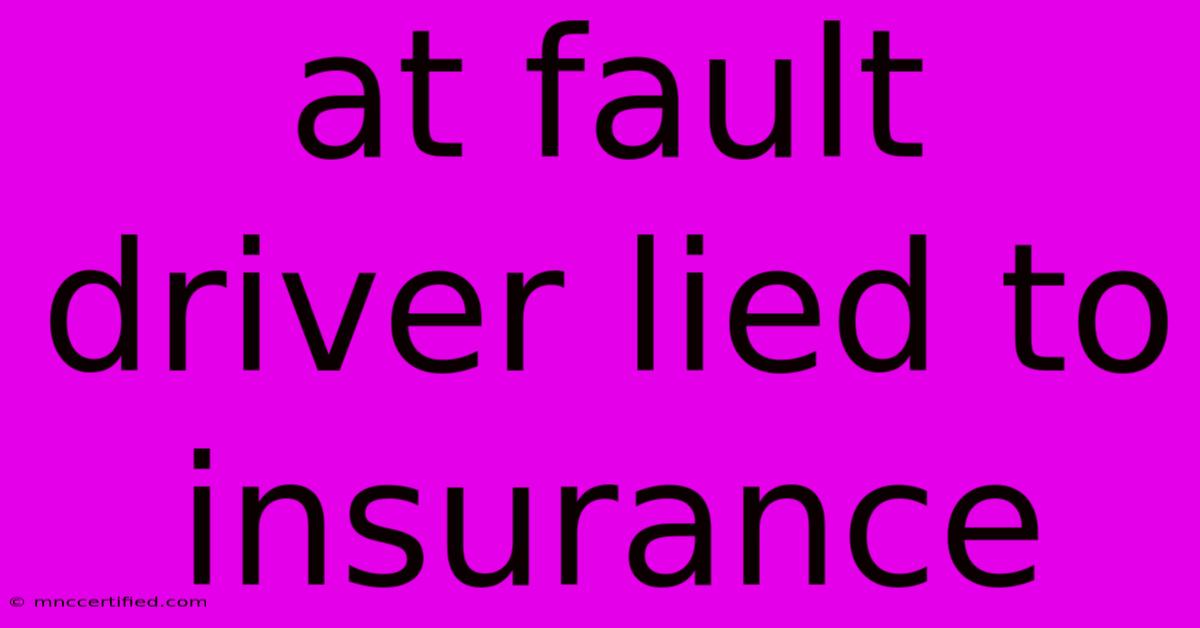At Fault Driver Lied To Insurance

Table of Contents
What Happens When the At-Fault Driver Lies to Their Insurance Company?
Car accidents are stressful enough without the added complication of an at-fault driver lying to their insurance company. This dishonest behavior can significantly impact your claim and your ability to recover compensation for your injuries and damages. Understanding the implications of this situation is crucial for protecting your rights.
The Consequences of an At-Fault Driver's Deception
When an at-fault driver lies to their insurer, several negative consequences can arise:
1. Delayed or Denied Claim:
The most immediate consequence is a delayed or even denied claim. Insurance companies investigate accidents thoroughly. If inconsistencies emerge between the at-fault driver's statement and other evidence (police reports, witness testimonies, medical records), the insurer may suspect fraud. This can lead to a protracted investigation and ultimately, a refusal to pay your claim.
2. Increased Legal Battles:
A dishonest at-fault driver often forces the situation into a lengthy legal battle. You may need to pursue a lawsuit to recover your rightful compensation. This adds significant time, cost, and emotional stress to an already difficult situation. Legal fees can quickly mount, potentially eating into any eventual settlement.
3. Difficulty Proving Liability:
Proving the other driver's liability becomes exponentially more difficult when they've actively concealed or misrepresented the facts. The insurance company may use their false statements to argue against your claim, even if other evidence points to their fault. Strong evidence, such as dashcam footage, witness statements, and police reports, becomes even more critical in these situations.
4. Higher Insurance Premiums for Everyone:
Insurance fraud affects everyone. When insurance companies pay out fraudulent claims or experience increased costs due to litigation arising from deception, they often pass those costs onto their policyholders through higher premiums. This is a systemic consequence that impacts all drivers.
What to Do If You Suspect the At-Fault Driver Lied
If you suspect the at-fault driver lied to their insurance company, you should take the following steps:
1. Gather and Preserve Evidence:
This is paramount. Collect any and all evidence supporting your claim, including:
- Police report: Obtain a copy as soon as possible.
- Photos and videos: Document the accident scene, vehicle damage, and your injuries.
- Witness statements: Get contact information from anyone who witnessed the accident.
- Medical records: Keep detailed records of all medical treatments, diagnoses, and prognoses.
- Repair bills: Maintain meticulous records of all repair costs.
2. Contact Your Insurance Company Immediately:
Notify your insurer promptly and provide them with all the evidence you have gathered. Be honest and thorough in your account of the accident.
3. Consult with an Attorney:
Consider contacting a personal injury attorney specializing in car accidents. They can advise you on the best course of action, assist in gathering further evidence, and represent your interests in negotiations with the insurance company or in court. An attorney can significantly improve your chances of securing a fair settlement.
Keywords for SEO Optimization:
- at-fault driver lied to insurance
- car accident insurance fraud
- insurance claim denied
- delayed insurance claim
- prove liability car accident
- personal injury attorney
- car accident lawyer
- insurance company investigation
- what to do if driver lied to insurance
- evidence car accident claim
Off-Page SEO Strategies:
- Guest blogging: Write guest posts on relevant blogs and websites about car accidents and insurance claims.
- Social media marketing: Share informative content related to the topic on social media platforms.
- Forum participation: Engage in relevant online forums and answer questions related to car accident claims.
- Local SEO: If you are a lawyer, optimize your Google My Business profile to target your local area.
By following these steps and understanding the potential consequences, you can significantly improve your chances of a successful claim even when dealing with an at-fault driver who has attempted to deceive their insurance company. Remember, your rights are protected, and pursuing them requires diligence and the right support.

Thank you for visiting our website wich cover about At Fault Driver Lied To Insurance. We hope the information provided has been useful to you. Feel free to contact us if you have any questions or need further assistance. See you next time and dont miss to bookmark.
Featured Posts
-
Kansas City Chiefs Gift Guide
Nov 19, 2024
-
Food Drive At Seahawks Game Nov 24
Nov 19, 2024
-
Jolie Son Knox On 2024 Red Carpet
Nov 19, 2024
-
How To See If A Car Has Insurance
Nov 19, 2024
-
Thanksgiving In Cny 2024 Events
Nov 19, 2024